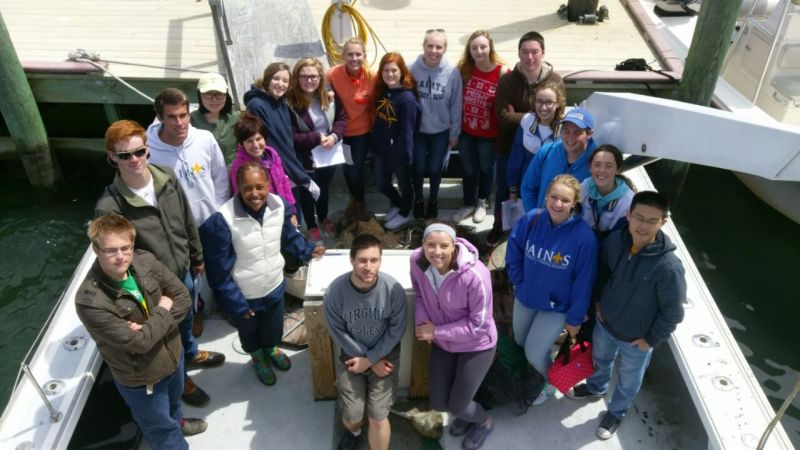Share this Story
Education at Sea
Nansemond-Suffolk Academy students set sail April 15 aboard Virginia Wesleyan's research vessel, the Ocean Explorer

A crew of Advanced Placement environmental science students from Nansemond-Suffolk Academy (NSA) set sail April 15 aboard the Ocean Explorer, Virginia Wesleyan's 45-foot research vessel owned in partnership with the Virginia Aquarium & Marine Science Center.
Eighteen students—led by the head of NSA’s Science Department, Laura George—departed from the Virginia Aquarium dock and cruised through Owls Creek and into the Oceanfront. Virginia Wesleyan Associate Professor of Biology Deirdre Gonsalves-Jackson and VWC students Marlan Hare '16, Rosalind Ludovici '16 (biology) and Elizabeth Quamme '17 (biology and classics) guided the group in sampling marine organisms and conducting water quality testing—including turbidity, dissolved oxygen, salinity, and sediment analysis.
The initiative is part of an ongoing effort by the College to expand mutually beneficial academic partnerships in the community, particularly within the sciences. Partnerships to date have included the NABT/BSCS Biology Teacher Academy (returning to VWC this summer); A series of biology student visits from King’s Fork High School, Nansemond-Suffolk Academy, Green Run High School, and Bayside High School Health Sciences Academy; A STEM day for Virginia Beach Public Schools STEM Academy students; A Shark Tank-style practice session for Bayside Middle School students competing for a spot in the Maker Challenge leg of the Virginia Beach STEM Trifecta Challenge; And a 3D printing demonstration as part of a science lesson on adaptation for students at Cedar Road Elementary School in Chesapeake.
“It is it an absolute pleasure to play a role in the growth and academic advancement of these brilliant young minds,” says Virginia Wesleyan College President Scott D. Miller. “It also presents an opportunity for us, as a college, to showcase our stellar programs, faculty and facilities. Many people don’t think of the sciences as being part of a liberal arts education, but that couldn’t be further from the truth.”
Since 2010, Virginia Wesleyan’s natural sciences building, Blocker Hall, has received close to $4 million in renovations, among them the creation of several research labs, updates to the auditorium, and the addition of a scanning electron microscope—the result of a $242,502 grant from the National Science Foundation (NSF).
Other big draws for natural science students are Virginia Wesleyan’s pre-professional programs, its NSF-funded STEM Scholars Program, and the College’s proximity to the Chesapeake Bay and Atlantic Ocean, which offers many opportunities for undergraduate research. The forthcoming Greer Environmental Sciences Center, scheduled for completion in summer 2017, will also further enhance VWC's growing sciences programs.
For more information, contact Hilve Firek, Batten Associate Professor of Education, at 757.233.8749 or hfirek@vwu.edu.

